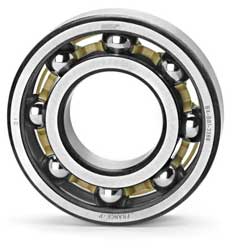
Posted to News on 10th Jun 2011, 23:08
SKF University Technology Centre for Steels
The SKF University Technology Centre for Steels was inaugurated in a ceremony that took place in the Department of Materials Science and Metallurgy at the University of Cambridge on 9 June 2011. Working in a genuine partnership, and with involvement from several other world-leading companies, SKF and the University of Cambridge aim to obtain and develop the necessary knowledge for designing the next generation of bearing steels.

Since the SKF UTC was established in May 2009, significant advances have already been achieved - such as the development and production in tonnage quantities of the world's first bulk nanocrystalline metal. This superbainitic steel does not require expensive alloying elements, processing or heat treatments, and it can be made large in three dimensions and in large quantities. The researchers reached this point by developing the theory for solid-state phase changes, thereby creating a steel that can be transformed at very low temperatures (relative to conventional heat treatments) into nano-scale slender plates of bainitic ferrite, embedded in austenite.
This innovative steel is characterised by extremely high strength, ductility and exceptional resistance to fatigue - which is exactly what is required for rolling element bearings. With the researchers committed to studying how to improve bearing steel in terms of wear and fatigue, the ultimate outcome can be expected to be higher-performance bearings with longer life - though no view has been expressed in terms of the likely timescales for new product launches or the scale of hoped-for improvements in performance or longevity.
Long-term commitment
The SKF UTC for Steels is intended as a long-term partnership that will benefit both parties considerably more than the simple sponsorship of research. As a minimum the UTC will operate for five years, and the current handful of researchers may grow to around 20. Leading the team of PhD researchers and post-doctoral fellows in Cambridge is Professor Harry Bhadeshia, a world expert in the physical metallurgy of steels.
Speaking at the inauguration, the Vice-Chancellor of the University, Professor Sir Leszek Borysiewicz, emphasised the benefits of long-term relationships, and stressed that the UTC provided SKF with access to not just the Department of Materials Science and Metallurgy but the whole university.
Tom Johnstone, President and Chief Executive Officer of SKF, in a wide-ranging speech, said that SKF wanted not only to gain access to knowledge and expertise in steels, but also to increase SKF's access and visibility to students, and to access the vast network to which Cambridge provides a gateway. He also said that, through the UTC, SKF could provide the University of Cambridge with access to 40 industries in which SKF operates, as well as the company's truly global operations and world-leading expertise in bearings and modelling.
UTC strategy
Speaking next, Dr Alan Begg, the Senior Vice President of Group Technology, Development, at SKF, explains the company's strategy of creating UTCs with universities that are leaders in SKF's seven core technologies: steel and heat treatment; non-metallic materials; sensorisation; tribology; modelling and simulation; lubrication; and sealing. But to illustrate SKF's own capabilities for achieving innovation in-house, he said that the company's new range of energy-efficient bearings was developed in just 18 months, resulting in bearings that reduce energy consumption by at least 30 per cent compared to standard ISO products. However, by creating UTCs based on the model developed by Rolls Royce over a period of 30 years, the expectation is that truly disruptive technologies can be developed.
The final speaker was Professor Harry Bhadeshia, the UTC Director, who explained some of the problems that his group is addressing, such as hydrogen embrittlement, and the methods by which new steels are being developed. As an aside, the superbainites that Professor Bhadeshia's team has developed so far have already proven to outperform all other types of armour. Meanwhile, Professor Bhadeshia is keen to get superbainitic bearings into service in order that the UTC can learn from users' experiences and improve the steel still further.
As mentioned above, SKF is also partnering with other universities to create UTCs for diverse aspects of bearing technology. For example, Imperial College London is working with SKF on tribology; Imperial was an obvious choice in this case, as Professor Stathis Ioannides was the Director for Product Engineering at SKF, and while at SKF he led the development of the SKF life theory, which subsequently became the new ISO standard for the calculation of rolling bearing life. Professor Ioannides is also a visiting professor at Imperial College London, which is recognised as one of the world's leading centres for tribology studies. Other universities at which UTCs have already been formed are Tsinghua in Beijing (investigating non-metallic materials and sealing), and Chalmers in Gothenburg (investigating sustainability and the environment). SKF will be encouraging the UTCs to interact with each other in order to maximise the potential benefits to all parties, as the seven core technologies are best considered within the context of each other, rather than in isolation.
SKF describes itself as the Knowledge Engineering Company. In the future, the UTCs - such as the SKF UTC for Steels in Cambridge - will help the company to make even better us of technology and knowledge engineering to differentiate itself from its competitors. Follow the link for more information about the SKF University Technology Centre for Steels.
Want the latest machine building news straight to your inbox? Become a MachineBuilding member for free today >>














